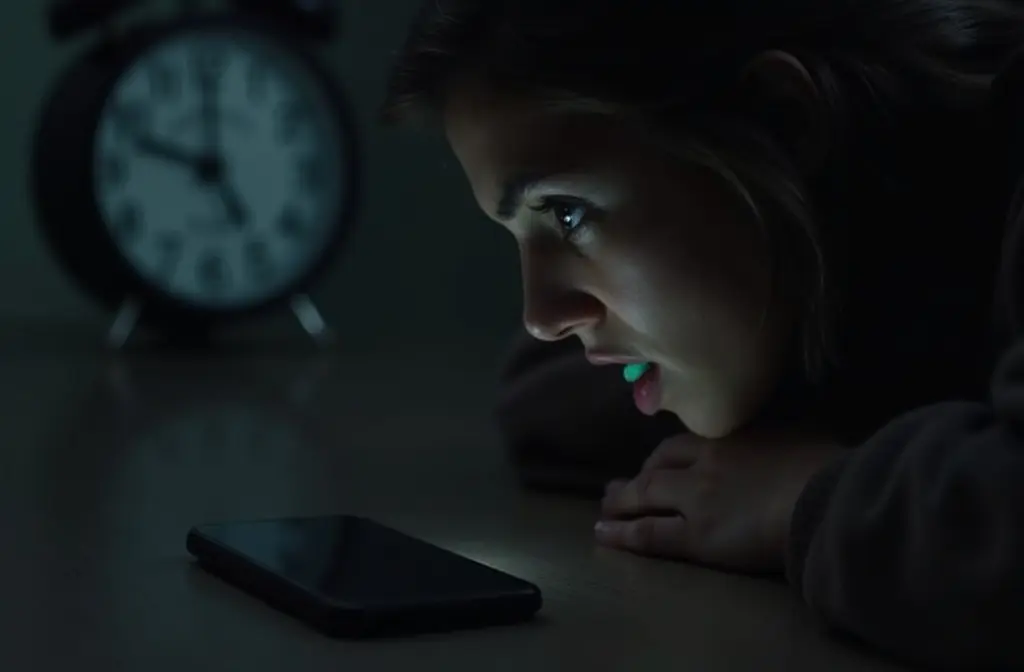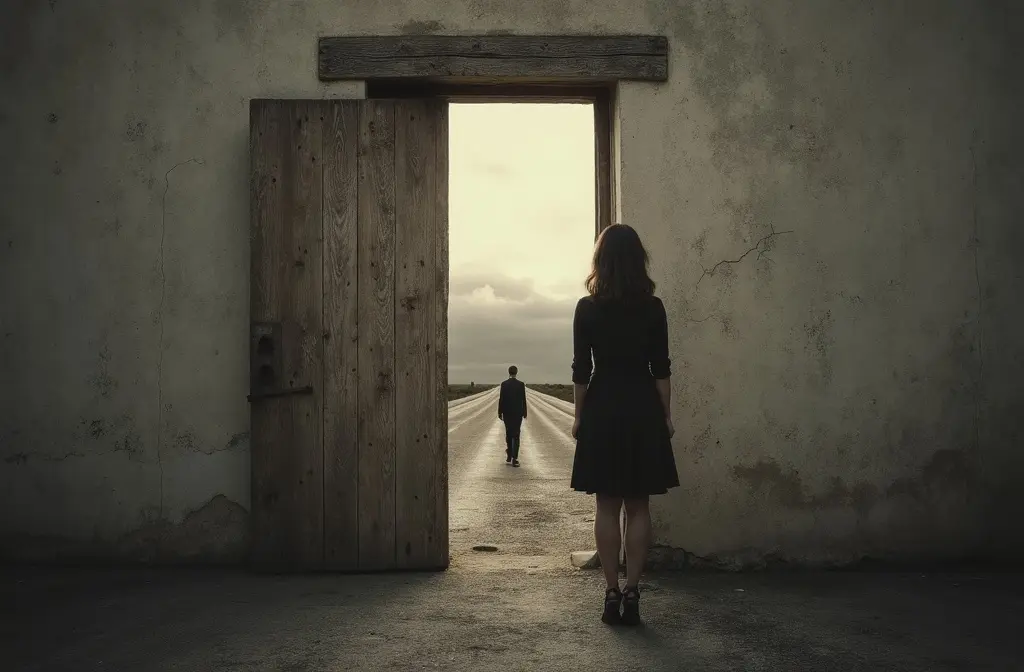It’s the middle of the night. 3 AM. Your heart is still beating a little too fast, an echo from a dream so real you could have sworn you were actually there. You were with them. An old friend from college, maybe. Or a first love whose memory still knows how to find the soft spots in your heart. It could even have been your grandmother, gone for years but suddenly right there, smiling at you. The dream’s details are already dissolving like sugar in water, but the feeling of their presence? That stays. It’s heavy and real. And as you lie in the silent darkness, one question surfaces, a quiet but insistent whisper: when you dream about someone, are they thinking of you?
This is a deeply human question. It springs from that ancient part of us that craves connection, that wants to believe our strongest bonds can stretch across any distance. We hope the invisible threads that tie us to our people can carry messages while we sleep. Is it just wishful thinking, a story we tell ourselves because we feel lonely? Or is there something more going on? Could a dream be a signal, a faint psychic ping from someone else’s mind to ours? This isn’t just about dreaming; it’s about the mystery of connection itself.
More in Connection & Dating Category
Key Takeaways
- It’s Usually About You: From a scientific view, dreaming of someone is your brain’s way of processing your own memories, feelings, and thoughts about that person. The dream is a mirror of your inner world, not theirs.
- Our Minds Look for Patterns: We often dream of people who mean a lot to us. If you wake up thinking of them and they happen to call that day, your brain screams “connection!” This is likely confirmation bias—you notice the hit and forget all the misses.
- The Spiritual Viewpoint: Many spiritual beliefs and personal stories suggest something deeper is at play. The idea is that powerful emotional bonds forge an energetic link that can sometimes allow for subconscious communication in dreams.
- Focus on the Feeling: The emotion of the dream is the real message. The person might just be an actor your mind cast to represent a feeling, a memory, or a part of yourself you need to look at.
- There’s No Hard Proof: While the idea of a psychic dream connection is beautiful, there’s no scientific way to prove it. For now, it lives in the powerful realm of intuition and personal belief.
Could My Dreams Be a Two-Way Street?
Waking up feeling the residue of someone else’s presence is a powerful thing. It’s not a forgettable dream about losing your car keys. These dreams have a certain gravity. They stick with you. You wonder about them while making your coffee, convinced there must be more to it than just random brain activity. But before we get lost in the mystery, let’s start with what we actually know is happening in our heads when we sleep.
What’s Really Happening in My Brain When I Dream?
Your brain doesn’t clock out when you go to sleep. It gets to work. During REM (Rapid Eye Movement) sleep, your brain is firing on all cylinders. This is the mind’s prime time for sorting through the massive inbox of the day’s events. It’s a mental filing clerk, deciding what to keep and what to shred. Important information gets stamped and moved into your long-term memory banks.
At the same time, your brain is dealing with feelings. The amygdala, which handles your emotions, is buzzing with activity during REM sleep. That’s why dreams can feel so incredibly real and hit you with such emotional force. You’re essentially running through emotional drills, processing things you felt during the day in strange, symbolic narratives. The person in your dream is a key player in this internal, nightly drama.
So, Is It Just My Mind Sorting Through Its Files?
A lot of the time, that’s exactly what it is. Someone’s appearance in your dream is often your brain’s way of chewing on a recent thought or a minor encounter. And it doesn’t take much. Seeing their face on Instagram, hearing a song that reminds you of them, or even a quick “how are you” in the hallway can be enough.
I remember this one dream I had about a guy from the accounting department. I barely knew his name. In the dream, we were on some wild adventure to find a legendary lost stapler. It was bizarre. I woke up totally confused. Why him? It took me half the morning to figure it out. The day before, we were the last two people to leave the building, and I’d held the door for him as we walked out. That was it. That tiny, throwaway moment was all my brain needed to cast him in a leading role. It wasn’t a psychic download; it was my brain doing its nightly housekeeping.
Have You Ever Felt a Connection That Goes Beyond Coincidence?
The scientific explanation is neat and tidy. It makes sense. But it doesn’t always satisfy the heart, does it? Some dreams feel too important, too real, to be dismissed as simple data processing. They arrive with a clarity and an emotional punch that a dream about office supplies just can’t deliver. These are the dreams that force us to question everything.
What About Those Dreams That Feel… Different?
You know the ones I’m talking about. They’re not foggy or chaotic. They are sharp, cinematic, and saturated with a feeling that sticks to your ribs for days. The conversation feels real. A hug feels like a real hug. The message feels like something you needed to hear. These are the dreams that make us believe in something more. People who have them often say they feel less like something their mind made up and more like a memory of something that actually happened.
This is where we step out of the lab and into the realm of intuition. Many people believe we are all linked by a subtle field of energy. When we share a deep emotional connection with someone—a soulmate, a best friend, a parent—that bond creates a strong energetic line between us. The idea is that when we are asleep, our minds become quiet enough to hear the whispers traveling along that line.
Could It Be a Sign of a Deeper Bond?
I think it can be. Several years ago, I started having recurring dreams about my childhood best friend, Sarah. I hadn’t seen her in over a decade. We were thick as thieves as kids, but her family moved away, and we just lost touch. In every dream, she looked sad and completely lost, and I’d wake up with a knot of worry in my stomach. It was a deep, persistent ache that made no logical sense.
After the fourth dream, I couldn’t shake it. I spent a whole afternoon playing detective online and finally found her. My heart was hammering as I typed out a message. “This is going to sound crazy,” I wrote, “but I keep dreaming about you.” Her reply came almost instantly. She was in the middle of a horrible divorce and felt utterly alone.
She told me that just a week earlier, she’d been flipping through an old photo album and cried looking at pictures of us, wishing she still had that kind of easy, loyal friendship in her life. Was it a coincidence? Maybe. But it felt like her heart had cried out, and some sleeping part of my own heart had heard her.
What Are Spiritual and Ancient Traditions Telling Us?
This idea that dreams are a portal to something more isn’t a modern invention. For thousands of years, cultures all over the globe have treated dreams as sacred. They were seen as a bridge connecting our world to the spirit world. For our ancestors, dreams weren’t just random noise from the brain; they were messages.
Did Our Ancestors Believe Dreams Were Messages?
Without a doubt. In ancient Egypt, dreams were considered direct communications from the gods, and they had trained priests to interpret them. The ancient Greeks built special temples where people could go to sleep in the hopes of receiving divine guidance in their dreams. Countless Indigenous cultures see the dream world as another dimension of reality—a place to communicate with ancestors, spirit guides, and even the souls of other living people.
In these worldviews, dreaming of someone wasn’t just a memory. It was a literal meeting of souls. The dream space was a real place. Therefore, if someone showed up in your dream, their spirit might actually be visiting you to offer comfort, ask for help, or deliver a warning.
Is There Such a Thing as a ‘Telepathic’ Dream?
This is where things get really interesting. Dream telepathy is the idea that two people can directly communicate mind-to-mind while asleep. Mainstream science is still very skeptical, but some formal research has explored it. The most famous experiments took place at Maimonides Medical Center in Brooklyn back in the 60s and 70s.
In these studies, a “sender” would concentrate on a specific image in one room while a “receiver” slept in another, soundproof room. Researchers would wake the sleeper during REM sleep and ask them what they were dreaming. The results were compelling. Time and again, impartial judges found that the dream reports were statistically more likely to match the sender’s image than random chance would allow. While these parapsychological studies are hard to replicate and face criticism, they show a serious attempt to investigate the phenomenon. They keep the door open to a possibility that is too fascinating to ignore.
How Can I Figure Out What My Dream Is Really About?
Okay, so you’ve woken up from another one of those dreams. You’ve considered that it might be your brain just doing its job, but you’re also open to the idea that it’s something more. What’s next? The key to unlocking your dream’s meaning isn’t just about who was in it, but why they were there. It’s time to put on your detective hat.
Are There Different Types of Dreams About People?
Yes. Learning to tell them apart can give you major insights. The person in your dream is often an actor playing a part. Your job is to figure out what that part symbolizes. Here are a few common dream types:
- The Processing Dream: This is your basic housekeeping dream. Like my dream about the accountant, the person is just a stand-in for a recent thought or event. It’s your brain filing the day’s paperwork.
- The Symbolic Dream: Here, the person isn’t really themself. They represent an idea. Dreaming of your third-grade teacher probably isn’t about Mrs. Davison; it’s about your relationship with learning or authority. Dreaming of an ex could be about a part of your own past, not the actual person.
- The Visitation Dream: These are often the most moving dreams. They usually involve a loved one who has passed away and feel incredibly real and peaceful. The person might appear healthy and offer you a message of love or reassurance. I had one about my grandfather a few years after he passed. I was struggling with a huge life decision. He just sat with me in the dream, held my hand, and said, “You know what to do. Trust your gut.” I woke up crying, but they were tears of relief. It felt like a gift.
- The Longing Dream: When you miss someone terribly, your mind can conjure them in a dream just to spend time with them. It’s a way of fulfilling your own wish for connection, and it can feel both beautiful and heartbreaking when you wake up.
Should I Pay More Attention to My Feelings Than the Person?
This is the most important rule of dream work. Your emotions in the dream are the clearest message. How did being with that person make you feel? Happy? Anxious? Angry? That feeling is the real subject. The person is just the vessel for the feeling.
Think of it like this: your subconscious needed to explore a feeling of, say, betrayal. It scanned through its database of everyone you’ve ever known and cast the person who is most connected to that feeling for you. They were just the best actor for the part. The dream is about the betrayal, not about them.
What If I Keep Dreaming About the Same Person?
A single dream is one thing. But when the same person shows up over and over again, it starts to feel less like a random movie and more like a summons. Your subconscious is knocking. And if you don’t answer, it’s going to start banging. A recurring dream is a message that demands to be heard.
Is My Subconscious Trying to Yell Something at Me?
Pretty much. A recurring dream is your inner self using a megaphone. It’s a giant, flashing sign pointing to an unresolved issue or an unexpressed emotion. There is some piece of business you have left unfinished, and the person in the dream is the key to figuring out what it is.
To get the message, you have to ask yourself some tough questions. What does this person represent? What was the core lesson or conflict of your relationship? Do they stand for a quality you wish you had, or a mistake you’re afraid of repeating? A recurring dream about an old flame often has nothing to do with getting back together. It’s about finally dealing with the feelings of rejection, guilt, or regret that the breakup left you with. The dream will probably keep coming back until you do.
Could It Be a Sign to Reach Out?
This is a really delicate question. Sometimes, as with my friend Sarah, the dream is a nudge to reconnect. But that isn’t always the right answer. Before you reach out, you have to be radically honest with yourself. What is your real motivation?
If you’re dreaming about an ex who has moved on, is reaching out truly for their benefit, or is it to soothe your own ego? It could be a selfish act. If you’re dreaming of someone who was a toxic presence in your life, making contact could be like willingly walking back into a fire. Use the dream for your own inner work first. Figure out what it’s trying to teach you. Once you do that, you’ll have a much clearer sense of whether the situation calls for you to send a text or just to make a shift within yourself.
So, What’s the Final Verdict? Are They Thinking of Me?
We’ve looked at brain science, ancient wisdom, and the kinds of personal experiences that defy easy answers. We’ve seen dreams as both mental filing systems and as spiritual telegrams. And now we’re back where we started, with that one quiet question that lingers after a powerful dream. Is it possible they’re thinking of you, too?
Can Science Give Us a Definite ‘Yes’ or ‘No’?
If you’re looking for hard, empirical proof, then the answer from science is a clear no. There is no device that can measure thoughts being sent from one person to another in a dream. The scientific position is that your dream is a closed-loop system. It’s a story written, produced, and directed by your own mind. And honestly, for most dreams, that explanation works just fine.
But Where Does That Leave Intuition and Personal Experience?
Logic can’t explain every corner of the human experience. It can’t explain why you get a sudden feeling you should call your mom, only for her to say, “I was just thinking about you!” It can’t explain the profound sense of peace a visitation dream can bring. Experiences like mine with Sarah don’t fit neatly into a scientific box. Was it just a wild coincidence, or was it something more?
I believe you have to hold space for both possibilities. You can respect the science and still honor the mystery. You can know a dream is likely a product of your own mind and also be open to the idea that we are connected in ways we don’t fully understand. In the end, you are the only expert on your own life. If a dream feels like a genuine connection, no one can prove to you that it wasn’t.
Why Does It Matter So Much to Us?
This question fascinates us because it’s about more than just dreams. It’s about our deep, primal need to feel connected. We want to believe that the people who have shaped our lives still carry a piece of us with them, and that the love we share is strong enough to cross any barrier.
So the next time you wake with the ghost of a dream still clinging to you, maybe you can ask a different question. Instead of “Are they thinking of me?” try asking, “What is this dream showing me about myself?” See it as an invitation. Dive into the feelings. Get curious about the connection. Whether the message came from their soul or from the deepest part of your own, it’s a message worth listening to.
FAQ – When You dream About Someone, Are They Thinking of You

Is there any scientific way to prove that dreams are messages from others?
Currently, science has no devices or methods to definitively prove that dreams are direct messages or thoughts from other people. Dreams are understood as products of your brain’s internal processes, although personal experiences and intuition may lead individuals to believe in deeper connections.
What should I interpret when I keep dreaming about the same person?
Recurring dreams about the same individual often point to unresolved feelings, ongoing concerns, or messages from your subconscious that need attention. Analyzing the emotions and symbolism in these dreams can help you understand what they are trying to tell you.
Can dreaming about someone indicate a spiritual or energetic connection?
Many spiritual traditions believe that strong emotional bonds can create energetic links, allowing for subconscious communication through dreams. These beliefs suggest that dreams could sometimes serve as a portal to deeper connections beyond physical interactions.
Why do I often dream about people who are important to me?
Dreams about significant people tend to represent your thoughts, feelings, or unresolved issues related to them. These dreams are a way for your brain to process emotions, memories, or experiences involving those individuals, rather than indicating their actual thoughts or intentions.




